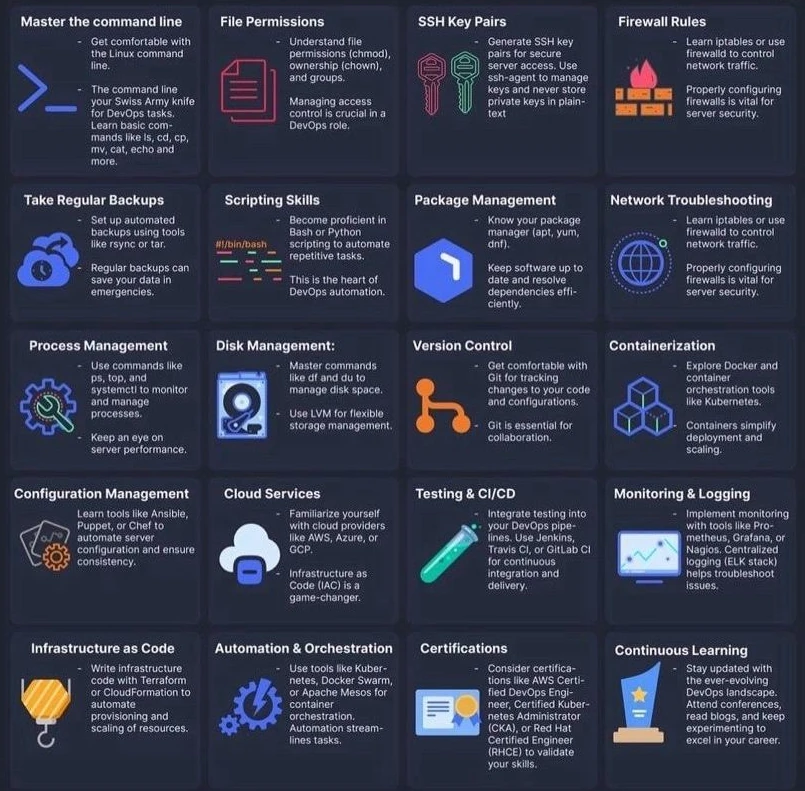20 Linux Administration Tips and Tricks to Help You Excel in a DevOps Career
Becoming a proficient Linux administrator opens many doors in the world of DevOps. Here are 20 in-depth tips and tricks to master Linux administration and excel in your DevOps career:
Master the Command Line: The Linux command line is powerful and flexible. Spend time learning command line utilities such as
grep,awk,sed, andfind. These tools allow you to perform complex tasks efficiently and quickly.File Permissions: Linux file permissions control who can read, write, and execute files. Understanding how to set permissions using
chmod,chown, andsetfaclensures the security and proper functionality of your files.SSH Key Pairs: Using SSH keys for remote server access is more secure than simple passwords. Learn to generate SSH keys with
ssh-keygenand deploy them usingssh-copy-idto enhance your system’s security

Firewall Rules: Firewalls protect your system by blocking unwanted traffic. Learn to configure and manage firewalls using
iptablesorfirewalldto define rules that allow or block traffic based on IP address, port number, and protocol.Take Regular Backups: Backups are your first line of defense against data loss. Understand different backup tools and strategies, such as using
tar,rsync, and remote backup solutions, to ensure you can always restore your data if needed.Scripting Skills: Automating tasks with scripts boosts productivity and reduces errors. Bash scripting is essential, but consider learning Python for more complex automation scripts.
Package Management: Knowing how to efficiently manage software and dependencies in Linux is crucial. Learn to use package managers like
apt,yum, orzypperto install, update, and manage software packages.Network Troubleshooting: Effective network management is key in DevOps. Use tools like
ifconfig,ip,nmap, andtcpdumpto troubleshoot network connectivity and security issues.Process Management: Managing applications and services efficiently ensures system stability. Master commands like
systemctl,ps,top,nice, andkillto control and prioritize processes.Disk Management: Good disk management prevents space issues. Utilize tools like
fdisk,parted,mount, andfsckto manage disk partitions and filesystems.Version Control: Version control systems like Git are essential for tracking changes and collaborating. Master Git operations such as commits, branches, merges, and rebases to manage code changes effectively.
Containerization: Containers provide a lightweight alternative to full virtual machines. Gain hands-on experience with Docker to package and run applications in isolated environments.
Configuration Management: Tools like Ansible, Puppet, and Chef automate the provisioning and management of your infrastructure. Learn to write playbooks, recipes, or manifests to automate setup and ensure environments are consistent and reproducible.
Cloud Services: Cloud platforms offer scalable resources for hosting applications and services. Familiarize yourself with services provided by AWS, Azure, or Google Cloud, focusing on virtual machines, storage, and networking.
Test & CI/CD: Continuous Integration and Continuous Deployment are pillars of modern DevOps practices. Implement tools like Jenkins, CircleCI, or GitHub Actions to automate testing and deployment, ensuring high-quality software production.
Monitoring & Logging: Monitoring systems help detect and resolve issues before they affect users. Use monitoring tools like Prometheus or Zabbix and logging tools like Elasticsearch, Logstash, and Kibana (ELK Stack) to keep an eye on system performance and troubleshoot issues.
Infrastructure as Code (IaC): Manage infrastructure through code rather than manual setup. Tools like Terraform and CloudFormation allow you to script and automate the provisioning of infrastructure resources, making it easier to manage and replicate environments.
Automation & Orchestration: Automate repetitive tasks and manage complex deployments using orchestration tools like Kubernetes, which helps manage containerized applications at scale.
Certifications: Obtaining certifications like RHCE (Red Hat Certified Engineer) or CKA (Certified Kubernetes Administrator) can validate your skills and improve your employment prospects.
Continuous Learning: Technology evolves rapidly, especially in DevOps. Keep up with new tools, technologies, and best practices through online courses, forums, and communities.
By enhancing your skills in these areas, you can effectively manage Linux systems and contribute significantly to DevOps projects, leading to a successful career in this dynamic field.